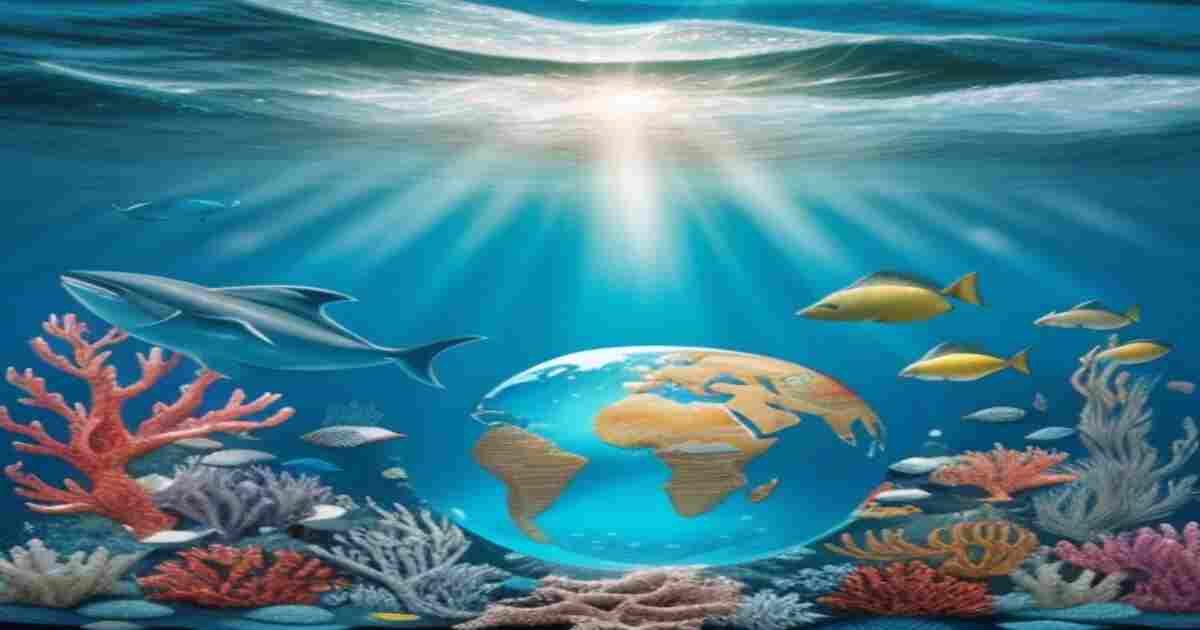World Ocean Day 2024: It is celebrated annually on June 8th, is a global event that honors our oceans and the critical role they play in our lives.
World Ocean Day 2024
Our oceans are indispensable to life on Earth, playing a crucial role in climate regulation and supporting diverse ecosystems. However, they are under significant threat from human activities and climate change. The urgency for action has never been greater. This article explores the interconnection between our oceans and climate, the challenges they face, and the actions we can take to catalyze positive change.
The Interconnection Between Ocean and Climate
How Oceans Regulate Climate
Oceans absorb about 30% of the carbon dioxide produced by humans and more than 90% of the excess heat from greenhouse gas emissions. This natural regulation helps mitigate climate change by buffering the atmosphere from drastic temperature increases.
Impact of Climate Change on Oceans
Climate change significantly impacts ocean health. Rising temperatures lead to ocean warming, causing coral bleaching and altering marine ecosystems. Additionally, increased CO2 levels result in ocean acidification, affecting shell-forming species and disrupting food webs.
Current Challenges Facing Oceans
Ocean Warming and Acidification
Ocean warming disrupts marine life and habitats, leading to shifts in species distribution and the decline of sensitive ecosystems like coral reefs. Acidification impairs the ability of marine organisms to build shells and skeletons, threatening biodiversity. ‘World Ocean Day 2024’
Sea Level Rise
Melting polar ice and thermal expansion of seawater contribute to rising sea levels, which threaten coastal communities, ecosystems, and infrastructure. This exacerbates the risk of flooding, erosion, and habitat loss.
Marine Pollution
Pollution, particularly plastic waste, severely impacts marine life. Microplastics have infiltrated the food chain, affecting organisms from plankton to whales. Chemical pollutants and oil spills further degrade water quality and harm wildlife.
Overfishing and Habitat Destruction
Overfishing depletes fish stocks and disrupts marine food webs. Destructive fishing practices, such as bottom trawling, damage seabed habitats. Protecting and restoring marine habitats is essential for maintaining biodiversity and fishery sustainability. ‘World Ocean Day 2024’
Catalyzing Action: What It Means
Definition and Importance
Catalyzing action involves initiating and accelerating efforts to address ocean and climate challenges. It emphasizes collaborative and innovative approaches to achieve significant and lasting impacts. ‘World Ocean Day 2024’
Goals of Catalytic Actions
The primary goals include reducing greenhouse gas emissions, protecting marine ecosystems, promoting sustainable use of ocean resources, and enhancing resilience to climate impacts.
Global Initiatives and Agreements
The Paris Agreement and Ocean Health
The Paris Agreement aims to limit global warming to well below 2°C, recognizing the critical role of oceans in climate regulation. It encourages countries to include ocean-related actions in their climate strategies.
United Nations Sustainable Development Goals (SDGs)
SDG 14, “Life Below Water,” focuses on conserving and sustainably using oceans, seas, and marine resources. It complements other goals that address climate action, poverty reduction, and sustainable development. ‘World Ocean Day 2024’
The Decade of Ocean Science
The UN Decade of Ocean Science for Sustainable Development (2021-2030) aims to support efforts to reverse the decline in ocean health. It promotes scientific research, innovation, and partnerships to achieve sustainable ocean management.
Local and Regional Efforts
Community-Based Conservation Projects
Local communities play a vital role in ocean conservation. Community-based projects, such as mangrove restoration and sustainable fisheries, foster stewardship and resilience against climate impacts. ‘World Ocean Day 2024’
Regional Agreements and Policies
Regional cooperation is essential for addressing transboundary ocean issues. Agreements like the Coral Triangle Initiative and the European Union’s Marine Strategy Framework Directive promote regional conservation efforts.
Case Studies of Successful Local Initiatives
Successful local initiatives, such as the establishment of marine protected areas (MPAs) in the Philippines and coral reef restoration in Florida, demonstrate the effectiveness of community-led conservation. ‘World Ocean Day 2024’
Role of Technology and Innovation
Technological Advances in Ocean Monitoring
Technologies like satellite remote sensing, underwater drones, and autonomous buoys enhance our ability to monitor ocean conditions and track changes. These tools provide critical data for informed decision-making.
Innovations in Pollution Control
Innovative solutions, such as biodegradable plastics, advanced waste management systems, and cleanup technologies like The Ocean Cleanup project, aim to reduce marine pollution and its impacts. ‘World Ocean Day 2024’
Sustainable Fishing Technologies
Technological advancements in sustainable fishing practices, such as selective gear and bycatch reduction devices, help minimize the environmental impact of fishing while maintaining productivity.
Policy and Governance
Importance of Strong Policy Frameworks
Effective policy frameworks are crucial for protecting oceans and addressing climate change. Comprehensive policies ensure coordinated actions, enforce regulations, and provide the necessary resources for conservation efforts.
Examples of Effective Ocean Policies
Policies like the Magnuson-Stevens Fishery Conservation and Management Act in the United States and the Common Fisheries Policy in the European Union have significantly contributed to sustainable fisheries management. ‘World Ocean Day 2024’
The Role of International Cooperation
International cooperation is essential for tackling global ocean and climate issues. Collaborative efforts, such as the Global Ocean Alliance and the High-Level Panel for a Sustainable Ocean Economy, promote shared solutions and commitments.
Economic Implications
The Blue Economy: Sustainable Use of Ocean Resources
The Blue Economy emphasizes the sustainable use of ocean resources for economic growth, improved livelihoods, and ocean health. It includes sectors like fisheries, tourism, renewable energy, and biotechnology. ‘World Ocean Day 2024’
Impact of Ocean Health on Global Economies
Healthy oceans support various industries and provide ecosystem services worth trillions of dollars annually. Degraded oceans, however, threaten these benefits and pose economic risks.
Investing in Ocean Conservation
Investing in ocean conservation yields significant returns by preserving ecosystem services, enhancing resilience to climate impacts, and supporting sustainable economic activities. Public and private investments are critical for funding conservation initiatives.
Education and Public Awareness
Importance of Ocean Literacy
Ocean literacy empowers individuals to understand the significance of oceans and their role in sustaining life. It fosters informed decision-making and encourages proactive conservation behaviors. ‘World Ocean Day 2024’
Educational Programs and Campaigns
Educational programs and campaigns, such as those led by the Ocean Conservancy and the Marine Stewardship Council, raise awareness and promote sustainable practices. These initiatives target schools, communities, and the general public.
Role of Media in Raising Awareness
Media plays a crucial role in highlighting ocean and climate issues. Documentaries, news reports, and social media campaigns can influence public perception and inspire action.
Corporate Responsibility
Sustainable Business Practices
Corporations can adopt sustainable practices by reducing waste, sourcing responsibly, and minimizing their carbon footprint. Such practices contribute to ocean health and set an example for others to follow. ‘World Ocean Day 2024’
Corporate Partnerships in Ocean Conservation
Partnerships between businesses and conservation organizations can amplify efforts to protect oceans. Collaborative projects, sponsorships, and corporate social responsibility (CSR) initiatives drive significant impact.
Case Studies of Corporate Initiatives
Examples of successful corporate initiatives include Patagonia’s support for marine conservation projects and Unilever’s commitment to sourcing 100% of its seafood from sustainable fisheries.
Individual Actions
Reducing Carbon Footprint
Individuals can reduce their carbon footprint by using energy-efficient appliances, reducing car travel, and supporting renewable energy sources. Lowering carbon emissions helps mitigate climate change and its effects on oceans. ‘World Ocean Day 2024’
Supporting Sustainable Seafood Choices
Choosing sustainable seafood helps protect fish populations and marine ecosystems. Consumers can look for eco-labels and support restaurants and retailers that prioritize sustainable sourcing.
Participating in Conservation Efforts
Individuals can join local clean-up events, volunteer with conservation organizations, and participate in citizen science projects. These actions contribute to tangible improvements in ocean health.
Challenges in Implementing Ocean and Climate Actions
Funding and Resources
Securing adequate funding and resources is a significant challenge for ocean and climate initiatives. Innovative financing mechanisms, public-private partnerships, and increased government support are needed. ‘World Ocean Day 2024’
Political and Social Barriers
Political will and social acceptance are crucial for implementing effective conservation measures. Overcoming resistance requires advocacy, education, and building consensus among stakeholders.
Measuring Impact and Success
Measuring the impact of conservation efforts is essential for assessing progress and guiding future actions. Robust monitoring, evaluation frameworks, and adaptive management practices are necessary for success.
Future Prospects and Long-Term Goals
Vision for a Sustainable Ocean Future
A sustainable ocean future envisions healthy, resilient oceans that support biodiversity, provide for human needs, and contribute to global climate stability. Achieving this vision requires sustained commitment and collaborative action. ‘World Ocean Day 2024’
Long-Term Strategies for Ocean and Climate Health
Long-term strategies include enhancing marine protected areas, reducing greenhouse gas emissions, promoting sustainable resource use, and fostering international cooperation. These strategies aim to secure ocean and climate health for future generations.
Conclusion
Catalyzing action for our ocean and climate is crucial for ensuring a sustainable and resilient future. By understanding the interconnections, addressing challenges, and taking proactive measures, we can protect our oceans and mitigate climate change. Every individual, community, and organization has a role to play in this collective effort. Let’s take action now to safeguard our planet’s most vital resources. ‘World Ocean Day 2024’
FAQs
What is the connection between the ocean and climate?
The ocean regulates climate by absorbing carbon dioxide and heat, influencing weather patterns, and supporting global ecosystems. Changes in ocean health directly impact climate stability.
How can technology help in ocean conservation?
Technology aids in monitoring ocean conditions, controlling pollution, and promoting sustainable fishing. Innovations like satellite remote sensing and underwater drones provide valuable data for conservation efforts.
What are some successful examples of ocean conservation?
Successful examples include the recovery of humpback whale populations, coral reef restoration projects, and community-led marine protected areas that enhance biodiversity and resilience.
How can individuals contribute to ocean and climate action?
Individuals can reduce their carbon footprint, support sustainable seafood, participate in clean-up events, and advocate for policies that protect the ocean and mitigate climate change.
Why is corporate responsibility important in ocean conservation?
Corporate responsibility ensures that businesses minimize their environmental impact, adopt sustainable practices, and contribute to conservation efforts. Corporate actions can significantly influence industry standards and consumer behavior.












